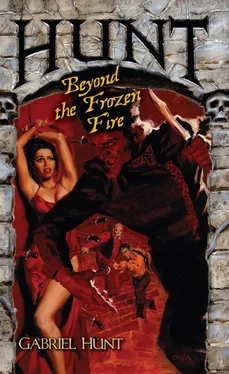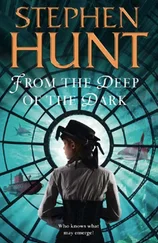Gabriel walked over to the primitive grain mill and picked up his Colt. It didn’t seem obviously worse for wear, other than a dusty coating of cracked hull fragments clinging to the grip. It was an antique that had once belonged to one of the Old West lawmen, either Wyatt Earp or Bat Masterson; it had been through worse. He brushed it off and slipped it under the waistband of his bark kilt. The gun wasn’t loaded, but its familiar weight still felt reassuring.
The structure next to the grain mill was indeed a well, and Gabriel swiftly hauled up the large hollow gourd that served as a bucket, greedily sucking down massive gulps of the cold, clean water. Then he filled the gourd again and untied the sturdy rope from the wooden post from which it hung. He brought the gourd to the edge of the pit and set it down while he anchored the rope to one of the support poles of a nearby hut. The rope was damp but seemed flexible and strong. He hoped it would hold Millie’s considerable weight.
“Hey, Millie,” he called, lifting the water-filled gourd and carefully lowering it into the pit. “Room service.”
Gabriel saw Millie pull himself up on his good leg and reach for the lowering gourd. When it landed in his hands, he drank deeply, emptying it in a single gulp.
“Damn,” he said. “It ain’t Abita, but it’ll do.” He gripped the rope and gave it an experimental yank. “This anchored?”
“Yes,” Gabriel said. “Do you need me to rig some kind of pulley system to get you up or do you think you can make the climb?”
“My arms ain’t broke,” he replied and immediately started climbing, fist over massive fist.
In thirty seconds, Millie was up, sitting on the lip of the pit, bathed in sweat, teeth clenched tight from his obvious pain.
” We’ve got a choice,” Gabriel said. “We can go in there—” Gabriel nodded toward the tall central building “—and deal with Velda, or we can see if we can spot the plane first.”
“You’re the one who’s always saying to have an escape route planned out before you go in somewhere,” Millie said, wincing as he got to his feet.
“True enough.” Gabriel walked to the tallest nearby tree. “You stay put, rest that ankle.” He jumped and grabbed hold of a low-hanging branch, chinned himself on it and got one leg up and over. From there he was able to make his way up, a branch at a time, to the upper regions of the tree. When he neared the top, he could see the plane. It was in a slightly different location than the first time they’d seen it and was surrounded by what looked like nearly the entirety of the village’s ablebodied population. Everyone wanted to see what Rue was doing with the Father Bird, apparently—or maybe all hands had been needed in order to move it.
Either way, the plane had been moved and uncovered; the encroaching vines and brush had been cleared away, revealing not just the plane but also a makeshift runway before it. The plane itself was a curious-looking antique, with far too many wheels along its belly and four huge propellers lined up in a row along the wings, two on either side of the cage-style cockpit. The long skinny tail ended in a broad, H-shaped fin that was decorated with a pair of black swastikas outlined in white. The body was battered and rusted but looked intact. Gabriel was pretty sure that he was looking at an Arado Ar 232 transport aircraft. Built to transport heavy cargo, including vehicles, it would have been an obvious choice to carry the bulky Untergang device. But why had a plane equipped with wheels rather than skis been chosen for an Antarctic mission? Could the Nazis have somehow known in advance about this warm tropical anomaly? How, when even modern satellite imaging had been unable to detect it? And if they had, why was there no record of the discovery found among Nazi papers at the war’s end?
Gabriel had no answers to these questions. And he knew there was no time for pondering them, not now. The plane had been moved, the runway cleared. And as he watched, he saw two of the propellers cough into motion, slowly at first, then faster. A moment later, they cut out—but in Rue’s hands they’d be going again, he knew that. And then the other two would. With Rue working on it, that plane was going to take off, with or without them on board.
And that meant there was no time to spare.
Chapter 25
“The good news,” Gabriel said, “is that most of the village is over there, meaning there can’t be more than a few people guarding Velda.”
“From what you described,” Millie said, “I’m not surprised. She’s not gonna want a lot of witnesses to what she’s up to—someone might figure out what she’s doing and try to stop her.”
“The bad news,” Gabriel said, “is that I’m sure the ones she’s kept around her—or, what may be more likely, the ones who refused to leave her side—are the diehards, the ones who’ll fight the hardest to protect her.”
“You really think they’ll fight for Velda the way they did for Uta? They never even met her before a day ago.”
“It’s not Velda they’re fighting for,” Gabriel said. “It’s the queen of Kahujiu.”
Millie threw up his hands. “So what do you suggest, boss? We haven’t got any spears, that gun of yours is empty—”
“They might not know that,” Gabriel said.
“Maybe not the locals,” Millie said. “But I’m pretty sure Velda can count to six.”
Gabriel pulled it from his waistband anyway. “She might have forgotten.”
“And I’m limping like Long John Silver. Won’t be much help in a fight.”
“Then we’ll just have to try and take her without a fight, won’t we?” Gabriel said, and stepped through the skull-framed archway, gun held high.
The first room they came to, with the pools and the flickering oil flames, was empty, the surface of the water in each pool still. They passed through to a short corridor and from there could see around the edge of a hanging animal hide into the room where Gabriel had been staked to the floor. The furs were still there, and the stakes, too, and the spherical machine at the far end atop its tall metal frame. Velda was crouched by its base, facing away from the doorway, peering at what looked like the yellowed pages of a notebook lying spread open on the ground. Anika stood beside her, waiting for a command, while two young huntresses, each gripping the wooden shaft of a spear in both hands, flanked them and kept an eye on the entrance.
Gabriel raised his left hand with three fingers extended, then silently curled one inward toward his palm. A second later he curled the next one in, leaving only his index finger sticking out. Millie nodded. Gabriel curled the last finger in. Sweeping the hide to one side, he burst through into the chamber and ran all out toward Velda, leveling his gun at her back. He heard Millie enter behind him and saw the eyes of the two guards widen as they saw him. Six foot seven, muscled like a stevedore, and completely naked except for the splint on his ankle, Millie would have widened the eyes of anyone who saw him coming toward them—but for these two young women, whose lifetime exposure to the male of the species had been limited to the sickly examples in the men’s tent and more recently the elderly Dr. Silver, Millie must have been an imposing sight indeed. That didn’t stop them from lowering their weapons and racing to block Gabriel’s charge—but it did buy him a few seconds, and in that time he was able to cross half the room.
He tucked his head down and somersaulted past as one guard stabbed her spear at the spot where his chest had been. The other darted to intercept him, but he dodged around her and grabbed Velda as she rose to her feet. She was dressed in a crimson gown like garment that crisscrossed over her barely covered breasts, wound around her slender waist and then flowed open to the ground behind her, revealing every inch of her tan, muscular legs. On her head was the feathered headdress.
Читать дальше












